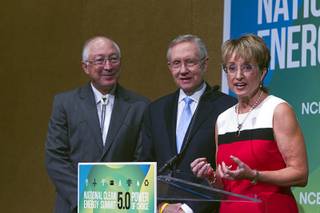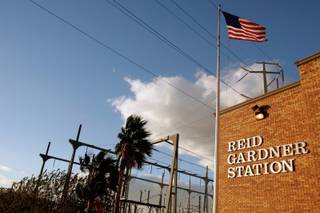Kicking off the fifth annual National Clean Energy Summit in Las Vegas, Sen. Harry Reid on Tuesday took aim at the state’s primary electricity provider, NV Energy.
During his opening remarks at the Bellagio, the Nevada Democrat criticized coal plants and said it’s “time to close the dirty relic we’ve built.” He acknowledged that closing one plant would not solve all energy problems, but for NV Energy, “the first step should be turn out the lights on Reid Gardner, and turn them out forever.”
The Senate majority leader was referring to NV Energy’s Reid Gardner Generating Station near Moapa, northeast of Las Vegas. The coal-fueled, steam-electric generating plant was built in the 1960s, though NV Energy says it has undergone “extensive technology improvements and is among the cleanest coal-burning facilities in the nation.”
As Reid sees it: “There is no clean coal. There’s 'cleaner' coal, but there is no clean coal," he said Tuesday.
Reid, who has no affiliation with the Reid Gardner plant, spoke with reporters about his speech and was joined by environmental activists and members of the Moapa Paiutes. Many people who live near the plant have respiratory problems, tribal chairman William Anderson said, adding that some people live as close as 300 yards from the plant, though he lives about 1.5 miles away.
"I try to stay as far away as I can," he said.
Jennifer Schuricht, a spokeswoman for Las Vegas-based NV Energy, said the company operates Reid Gardner "in the best interests of our customers, in compliance with all federal and state laws, and in an environmentally responsible manner."
She also said the company recently added technology "to capture 99.9 percent of particulate emissions." Moreover, NV Energy's high-efficiency scrubbing systems help the plant "consistently rank" among the top 10 percent of plants nationwide for low sulfur emissions, she said.
Meanwhile, activists held a rally outside the Bellagio on Tuesday calling for NV Energy to stop using coal and push further into clean energy.
The Sierra Club organized the rally. The environmental advocacy group submitted a report to the Public Utilities Commission of Nevada in June that said it would cost less to shutter Reid Gardner next year instead of running it for another decade.
According to the organization, NV Energy could save $59 million of operating costs if the company retired all four units of the plant in 2013, rather than continuing to operate it until 2023.
Speakers scheduled at the all-day summit include former President Bill Clinton, Interior Secretary Ken Salazar and Elon Musk, CEO of electric auto maker Tesla Motors. The event is hosted by Reid, MGM Resorts International, UNLV and others.
The summit comes one day after federal officials, at a press conference in Las Vegas, announced a $105 million loan guarantee for Pleasanton, Calif.-based Fulcrum BioEnergy to help finance the development of a plant near Reno that would turn garbage into biofuel. The plant is expected to create some 430 jobs during construction and 53 permanent jobs.
When operational, it will convert 147,000 tons of processed, municipal solid waste into more than 10 million gallons of ethanol each year. It will use a pressurization process that does not involve incineration.


